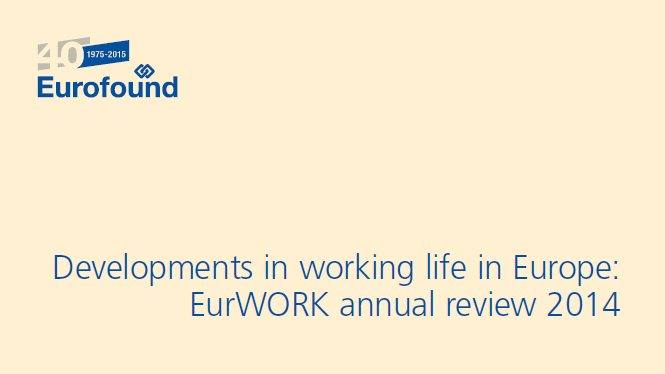
News -
Developments in working life annual review shows a Europe in flux
(Dublin, Ireland:) The Developments in Working Life in Europe 2014 annual review, which is part of a series of annual reviews published by Eurofound, shows that Europe is undergoing significant changes in terms of its economy, industrial relations and working conditions. Although progress is being made in all three areas, the enduring economic crisis has made this progress both fragile and unequal.
The annual review shows that although overall trends can be established, the haphazard nature of economic recovery in Europe has produced multi-directional tendencies. This can be seen in the area of collective bargaining, where there has been a decline in collective bargaining coverage in Portugal, the Netherlands and Romania, as well as a simultaneous effort by governments to promote collective bargaining in Germany, France and Estonia. In some cases there has also been a continuation of trends for decentralised collective bargaining, while in other countries and industries this trend has been stalled or reversed.
There have been favourable pay developments in Europe in 2014, both in terms of collectively agreed wages as well as in the increase to statutory minimum wages agreed during 2014. However in some Members States minimum wages remained frozen or virtually unchanged because of low rates of inflation. Last year also saw the introduction of the statutory minimum wage in Germany, a development which raised debate both nationally and in other Member States without a statutory minimum wage.
There has also been further moves towards a more flexible labour market, with a small overall increase in fixed-terms contracts, casual work and involuntary part-time work in Europe, as well as some evidence pointing to an increase in self-employment due to a lack of other employment opportunities. In response more countries have proposed legislation to regulate fixed-term and flexible contract arrangements in order to ensure more protection and equal pay, as well as increasing flexibility and rights on paternity, maternity and parental leave.
Occupational health and safety remained an important area for governments and social partners in 2014. Psychosocial risks are also increasingly recognised as a cause of poor health and several countries have introduced measures to deal with this, involving strong collaboration between social partners. Legislation on psychological risks is, however, still rare when compared to physical risks.
Finally, despite the promotion of the modernisations of workplaces across Europe, EurWork’s research suggests that there were only a modest number of initiatives in 2014 that could be labelled as ‘workplace innovation’ and that many of these came from countries that already have a long-standing tradition of employee involvement and a more employee-centred approach to work organisation.
To read the report in full go to: http://bit.ly/EurWork2014

